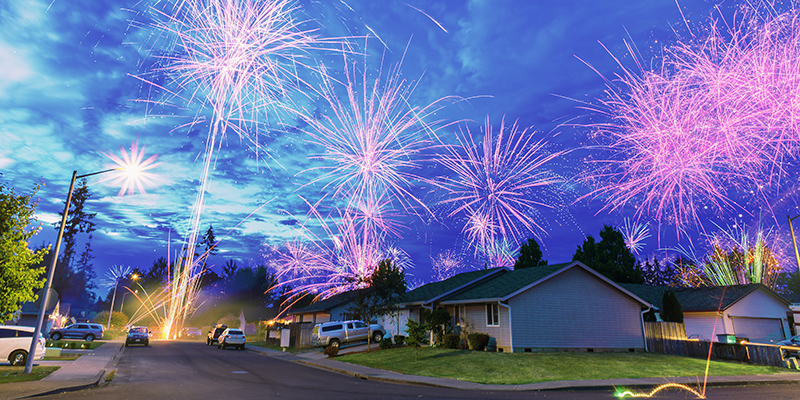Can An HOA Ban Fireworks?

Fireworks are a common way to celebrate several holidays in the United States. But, apart from providing a spectacular visual display, fireworks can also be dangerous. This leads us to the question — can an HOA ban fireworks?
Browse By Category
Sign up for Our Newsletter
Fireworks are a common way to celebrate several holidays in the United States. But, apart from providing a spectacular visual display, fireworks can also be dangerous. This leads us to the question — can an HOA ban fireworks?
Is It Normal for an HOA to Ban Fireworks?
Homeowners associations are responsible for maintaining the curb appeal and property values in their respective communities. One of the ways these associations accomplish this is by imposing strict rules that residents must follow. This holiday season, a common question both boards and homeowners ask is whether or not an HOA can ban fireworks.
To put it simply, it is normal for a homeowners association to ban or restrict fireworks, especially in areas with a higher risk of wildfires. The topic is more hotly contested in some municipalities than others.
For example, in Oregon, many communities already have existing bans on fireworks. Oregon has been on the receiving end of intense wildfires. As such, it does not come as a surprise that HOAs are taking precautions.
But, it is not just the homeowners associations that are taking matters into their own hands. Several municipalities also have restrictions on fireworks and how homeowners can use them. In California, many cities and counties already have similar prohibitions in place due to a higher risk of wildfires in the area.
Bans on fireworks are more prevalent in condo communities. But, it is also not unusual to find them in the governing documents of single-family associations, especially if the community is located next to or near a forest.
Can an HOA Restrict Fireworks?
Of course, there is also the question of whether or not it is even legal for an HOA to ban fireworks. The answer, though, can vary from one state to another.
For instance, a recent law (Section 791.08) passed in Florida does not allow HOAs to prohibit fireworks during designated holidays without an explicit restriction written in the declaration. Interestingly, this new law does not apply to condominiums, which are still free to prohibit all kinds of fireworks.
Because not all states have similar laws, it is imperative for boards and homeowners to check their own state statutes for guidance. If an HOA is allowed to do so, it is a good idea to enact restrictions on fireworks.
Aside from posing a risk to safety, fireworks also tend to be very loud. This can go against existing noise rules in the community. Fireworks can also startle residents with dogs or veterans who are suffering from post-traumatic stress disorder. For associations that are located in Florida, it may be worth revisiting and amending the recorded declaration to include the restriction.
What Fireworks Should an HOA Ban?
According to the National Fire Protection Association, a total of 19,500 fires were the result of fireworks in 2018 alone. These fires caused five deaths and 46 civilian injuries, not to mention $105 million worth of direct property damage.
Though the NFPA does not detail what kind of fireworks started these fires, it is best to ban fireworks that shoot up in the air. Those are the ones that truly pose a risk and can end up hurting a neighbor or starting a fire. Ground-level fireworks or those that remain on the pavement (once lit) are generally fine.
Enforcing an HOA Ban on Fireworks
It is easy to create a rule that prohibits homeowners from setting fireworks off, even during holidays. The hard part comes with enforcement. Fireworks typically take place after working hours and in the dark, as that is when they truly shine. As such, it is difficult to pinpoint which homeowner or property the firework came from.
 Still, having a rule banning or restricting fireworks is better than having none at all. With a rule, an HOA board can at least hold something against an offending homeowner. Conversely, if an HOA lacks such a rule, homeowners are free to set fireworks ablaze, and boards can do nothing about them.
Still, having a rule banning or restricting fireworks is better than having none at all. With a rule, an HOA board can at least hold something against an offending homeowner. Conversely, if an HOA lacks such a rule, homeowners are free to set fireworks ablaze, and boards can do nothing about them.
In addition to a rule, it is equally important to have a fee structure for fining homeowners who violate the rule. Most homeowners associations already have an existing framework for fines and violations. This framework can be applied to the fireworks rule, too. Though, the amount can be slightly larger than a normal violation since this has to do with jeopardizing the safety of residents.
What HOA Communities Can Do
Imposing a ban on fireworks is ultimately within the community’s best interest. But, not all homeowners will see it this way. Some residents may lash out at an HOA board that adopts such a rule, claiming that fireworks are the most fun part of the holiday. To quash these complaints, boards must make it clear to everyone why the association has decided to enact the rule in the first place. Explain the dangers of fireworks and how they can affect people in the community.
Another way HOAs and homeowners can reach a compromise is by organizing a professional fireworks display. A homeowners association can schedule a fireworks display at a certain time on the Fourth of July, New Year’s Eve, or New Year’s Day, which residents can attend and watch together. This will require an association to hire professionals as well as get a permit (in some areas).
If an HOA does decide to allow certain fireworks or puts up a display of its own, it is important to make sure its insurance policy is up-to-date. An association’s insurance should include coverage for fireworks-related liability and damages, though this may come at an added cost to the HOA. Similarly, an HOA board should remind homeowners to update their homeowner’s insurance.
Can HOA Restrict Fireworks in a Community?
When it comes down to it, an HOA’s ability to restrict fireworks comes from state laws and its governing documents. It is not the same for all homeowners associations. Still, if an HOA has the power to do so, it is within the community’s best interest to prohibit the more dangerous fireworks (i.e. those that shoot up in the air). An HOA ban on fireworks may invite backlash from a few residents, so boards should be prepared.
Is your HOA board having a tough time handling HOA rules, violations, and homeowner complaints? Start looking for an HOA management company to lighten your load. Use our comprehensive online directory to search for trusted HOA management companies in your area!
RELATED ARTICLES:
- What Is A HOA Board Resolution And How To Create One?
- 7 Ways To Help HOA Aging Residents
- Keeping The Neighborhood Safe For Aging Residents In An HOA Community
Trending Now
Related Article
Sign up for Our Monthly Newsletter
Sign up below for monthly updates on all HOA Resource
















